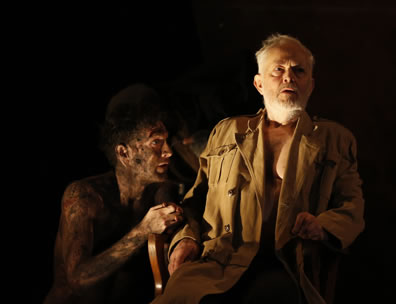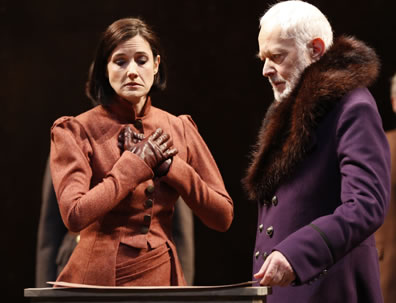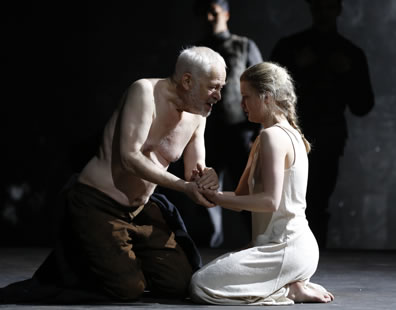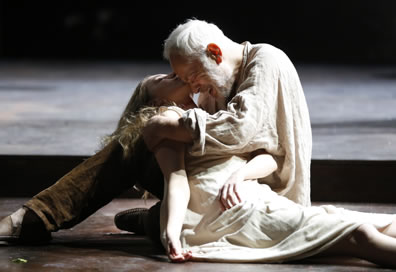King Lear
A Favorite Actor Comes Full Circle,
But Too Much Meddling Robs the Moment
Theatre for a New Audience, Polonsky Shakespeare Center, Brooklyn, N.Y.
Saturday, March 29, 2014, E–109&110, center section of deep thrust theater
Directed by Arin Arbus

Jacob Fishel plays Edgar, here disguised as Poor Tom, opposite the former Edgar and current King Lear, Michael Pennington. Photo by Carol Rosegg, Theatre for a New Audience.
Moments come when you realize just how much time has passed in your life: a baseball player you saw as a rookie enters the Hall of Fame, your co-workers have never heard of The Doors, and a young talent you once saw playing Edgar is now an established stage star playing King Lear.
It was my third theatrical experience of William Shakespeare, the 1977 Royal Shakespeare Company production of King Lear at the Aldwych Theatre in London. Michael Pennington played Edgar. He struck a chord I remember so well, as he did with his performances as Berowne in Love's Labour's Lost, as the Duke in Measure for Measure (both for RSC in the late 1970s), and as Hal and Henry V in the English Shakespeare Company productions of the Henry IV/V trilogy. (We also saw his direction of Twelfth Night in Chicago in the 1990s and his John of Gaunt in the RSC's recent Richard II.) What always struck me was Pennington's physical exuberance combined with his smoothly poetical line readings, plus his physical connection to the audience. As Berowne, he spoke much of his "have at you then, affection's men at arms" speech directly to me sitting in the second row.
It's instructive that in all the years I have been watching and reading Shakespeare, I only have one speech in the entire canon memorized. Here goes:
The weight of these sad times we must obey
Speak what we feel, not what we ought to say
The old hath borne most, we that are young
Shall never see so much, nor live so long.*
This is the closing speech of King Lear, spoken by Edgar in the Folio version and, thus, Pennington in that RSC version. I had it memorized by the time I saw my second King Lear six months later. That is what Pennington's Edgar meant to me.
And here he is coming full circle by playing the title role of King Lear at the Theatre for a New Audience's new home, the Polonsky Shakespeare Center in Brooklyn, N.Y. It's all there: his youthful exuberance (struggling against the increasing infirmities of Lear's four-score years), his smooth poeticism (disrupted by Lear's fits of temper and insanity), and his audience connection, which tightens the heartstrings for the play's devastating ending.
Pennington leads a mostly skillful cast in a constrained production under the direction of Arin Arbus. With costume designer Susan Hilferty dressing the characters in Edwardian-style military uniforms and dress suits, all solid, muted pastels, the action takes place on a bare stage against a riveted metal wall (scenic design by Riccardo Hernandez). Much of the thematic atmosphere is provided by Marcus Doshi's lighting, especially the storm on the heath during which lightning intermittently bathes the stage in blinding flashes. The battle between the Albany/Cornwall and Cordelia/Lear forces is represented by the sounds of combat emanating from the air around us—gunfire, bullets whistling past, shouts, galloping horses, piercing female-pitched screams. This visceral mix is hauntingly delivered by co-sound designers Michaël Attias and Nicholas Pope as the blind, confused Gloucester (Christopher McCann) staggers around the stage.
This production has the key trademark of an Arbus-helmed Shakespeare play: intelligent insights into specific lines informing important moments that turn the plot. Here she goes not for contextual trappings but dramatic resonances inherent in the play itself, whether Shakespeare intended them or not (that's not a criticism: one of the beauties of Shakespeare is the myriad ways individual characters can be understood and delivered in individual performances).
Note the way Edmund (Chandler Williams) reacts in the opening scene when his father Gloucester informs Kent (Timothy D. Stickney) that after nine years abroad for his education, his bastard son "away he shall again." This is news to Edmund, and not welcome news, either, and his reaction we remember when he soliloquizes at the start of the next scene on his scheme to get rid of stepbrother Edgar (Jacob Fishel) on the way to taking control of Gloucester's estate.
Note the way Lear pats Goneril's tummy when he talks of his dowry "to thine and Albany's issues be this perpetual." We remember this when he later pointedly curses her womb that it may spring forth a "child of spleen" so that Goneril "may feel how sharper than a serpent's tooth it is to have a thankless child."
"Nothing comes of nothing," Lear warns Cordelia when she refuses to "heave her heart into her mouth" in the play's opening scene. Later, the Fool, in his lesson to Lear of the egg being cloven in two and all its "meat" eaten, concludes with "thou hast pared thy wit o'both sides and left nothing i'th'middle," prompting Pennington's Lear to remind himself that nothing comes of nothing (an extra-textual line, yes, but apt).
Oswald (Mark H. Dold) is having a sexual affair with Goneril. This not an uncommon interpretation, though every time I see it I'm hard-pressed to believe such a guy would insist with his dying breath that his killer should still deliver Goneril's letter to Edmund. However, this Oswald watches in admiration as Goneril seduces Edmund, helping to shed a light on the pandemic sexual infidelity of Lear's kingdom, in obvious testimony of which is Gloucester's public acknowledgement of the "good sport" at Edmund's getting and Poor Tom's account of formerly being a servingman who "served the lust of my mistress' heart, and did the act of darkness with her" (the irony being, of course, that the man playing Poor Tom, Edgar, would eventually kill such a servingman, Oswald).
Though the production clocks in at just over three hours, Arbus makes several cuts, most notably Cordelia's asides in the opening scene explaining why she will not go along with the "who loves me most" contest. Cutting these asides has become the norm of recent Lears I've seen, and as removing these lines undermines the character of Cordelia and the true tragedy of Lear's misjudgment, I don't understand why directors do it. I see no justification here, either, though this Cordelia (Lilly Englert) clearly finds any kind of public speaking a chore she'd just as soon forego. Other cuts, noticeable to me, are not detrimental to the production.
Arbus steps over the fence into a psychological minefield when she inserts a non-Shakespearean scene explaining the Fool's disappearance. Despite the play's timing, Jake Horowitz plays him as an allowed fool of the old English tradition, perhaps autistic and definitely suffering a gait impairment with his left foot turned inward. He departs the heath without Lear, but then shows up again a few scenes later and hangs himself. Unnecessary at the time, this extratextual scene echoes at the absolute worst moment.

Regan (Bianca Amato) expresses her love to Lear (Michael Pennington) in the Theatre for a New Audience production of King Lear. Photo by Carol Rosegg, Theatre for a New Audience.
Pennington's Lear has in him what Kent and the rest of us would fain call master: authority. He is, clearly, a great king. But the very things that make him that king—quick resolution and unwavering authority—undo him quite as a father. This production further plays on the dynamics of a three-sibling household. The eldest, Goneril, has a measure of Lear's respect for being his first issue—his kingdom clearly continues through her. The youngest, Cordelia, is Lear's favorite for being the last. And then there is the middle one, Regan. Pennington's Lear hardly knows who she is, so much has he apparently neglected her over the years, and this gnawing reality is the foundation of Bianca Amato's searing portrayal of Regan. When she expresses her love in the court pageant at the play's start, she barely contains her cynicism and is too glad to get the charade behind her.
Regan has a barely tolerable relationship with Goneril, played by Rachel Pickup as a stoic woman who knows her place and responsibility but has a roaring passion in her breast nonetheless. Goneril is the only sister who spends any stage time with her high-collared jacket unbuttoned, and in the presence of the virile Oswald or Edmund she's almost bursting through the silky camisole underneath. We can't be sure if Albany (Graham Winton in a portrayal of steady sturdiness) really is a milksop as she and Oswald report him or if Goneril has simply grown weary of his bed and wants more. Both Goneril and Regan have little if any affection for Cordelia, who returns the dislike in kind (by contrast, Fishel's Edgar has an easy bonhomie relationship with Edmund, not only respectful of his half-brother but glad to have him around, making Edmund's betrayal of him more torturous).
These sibling relationships inform Lear's interactions with his daughters in Pennington's playing. He can't understand how Goneril, his trustworthy eldest, would suddenly turn unaccommodating. He delivers the line "Yet have I left a daughter," as if it suddenly occurs to him that, yes, there is that middle one. With Regan he behaves as if they are old acquaintances, but in fact it is more like meeting someone at a high school reunion you can't quite place. Meanwhile, having grown accustomed to an absent father when she was growing up, she chooses to get away from her own home before Lear arrives, and her indifference toward him now totally baffles him. In his estimation, the fact that he is her father should suffice to earn her undying love, and so in something close to astonishment he tells her, "I gave you all." A lifetime of being ignored bursts through Amato's Regan as she replies, "And in good time you gave it."


Top, Lear talks of the fun he and Cordelia will have in prison, a tender moment perhaps recalling their relationship when she was a little girl. Bottom, Lear mourns over the lifeless body of his baby girl. Michael Pennington plays King Lear and Lilly Englert plays Cordelia in the Theatre for a New Audience's production of King Lear at the Polonsky Shakespeare Center. Photos by Carol Rosegg, Theatre for a New Audience.
Cordelia was Lear's little girl before she embarrassed him in front of the court and rulers of France and Burgundy (in this production, Terry Doe and Jon Stewart Jr., respectively, are on stage during the love speech ceremony). We see this relationship finally return when the two are captured and hauled off to prison. "So we'll live, and pray, and sing, and tell old tales, and laugh at gilded butterflies": As Pennington delivers these lines, we sense that the two engaged in such games when she was a child. Now that he has his baby girl back—"Have I caught thee?" he asks in amazement—all he wants is to relive the richest memories of his fatherhood.
So, if the tears aren't flowing yet at this point, the dam bursts with his first howl as he walks backward along a gangway cutting through the audience to the stage as he drags the dead Cordelia, rope burns visible around her neck. As with the battle, this harrowing sound comes from within the audience, but it's not a recording: it's Pennington. When he was on stage as Edgar in that 1977 production, Donald Sinden as Lear let loose such a howling and in such a way that it still reverberates in my stomach 37 years later. Lacking the power of Sinden's voice, Pennington still captures the cracking soul, heart, and mind of that Lear's howl with his own wailing of intolerable loss.
Laying her body on the stage, Pennington's Lear tries to wish her back to life. He is not so mad to know it's fruitless; rather Pennington presents a Lear who just can't bear the truth. Even as other stage business occurs—Kent revealing himself to Lear, the servant delivering news of Edmund's death, Albany trying to re-establish government—we can't take our eyes off Pennington or retrieve our hearts that he now molds in the hands with which he cradles his dead baby girl. "My poor fool is hanged!" he wails.
Whooooosh! our minds involuntarily whip back to that stupid scene of the Fool hanging himself, and we are taken out of this moment. I have to believe this is intentional, that Arbus really means for Lear to be recalling his Fool at this moment and not just his dead baby girl (and if she doesn't mean for Lear to be actually talking about the Fool, she nevertheless is making a thematic connection that may seem clever in scholastic theory but trumps the purely emotional catharsis we were experiencing on stage with Pennington). Many literary critics like to believe that Lear is actually referring to the Fool with this line, but the context of the speech indicates otherwise as it comes right after news of Edmund's death and continues with Lear's sense of injustice that "a dog, a horse, a rat have life, and thou no breath at all?" Alternatively, some scholars feel Shakespeare is slipping in an inside joke, that the same boy actor playing the Fool played Cordelia (they are not on stage at the same time, and Lear often calls the Fool "boy"). However, the Fool is very much the kind of role Robert Armin, a member of Shakespeare's company, specialized in, and it's hard to see him also playing Lear's youngest daughter.
Besides, all of this is naught if any of these scholars and critics watched Pennington in this moment. Or, for that matter, if Arbus really knew what she was getting with this particular actor. Over the years I've put up with many a Shakespeare-soiling by directors, but never have I been so furious as I was at this point in this production. I hate to end this essay on such a sour note, but that's exactly how Arbus ended this otherwise fine performance by one of my favorite actors in one of my favorite Shakespeare plays.
[*Double-checked Edgar's finale speech and got two things wrong: the first line actually ends with this sad time, and in the third line the word is oldest instead of old.]
Eric Minton
April 4, 2014
Comment: e-mail editorial@shakespeareances.com
Start a discussion in the Bardroom



 Find additional Shakespeareances
Find additional Shakespeareances